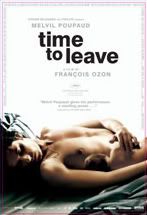Time to Leave
 Time to Leave ***
Time to Leave ***"Time to Leave" has a disadvantage, in the fact that it doesn't really have any kind of original story, and its up to the actors to really shine to make this piece of taken material to a special height, and it does exactly that.
Famous French director Francois Ozon, who I'm not reallt familar with save last years "5x2" gives us the story of Romain, a gay photographer living in Paris. He lives with his boyfriend, in such a dull and empty relationship, that when he wakes up in the morning and looks at him, it appears that a dark cloud ends up covering the sun. Him and his family are disconnected. He hardly speaks to his parents, and him and his sister are constantly bickering with one another. When she and her husband are having problems, he doesn't console her, he just makes her feel worse. And she can't seem to accept him being gay, as when the subject of him being able to adopt a kid one days comes into the picture, she just discards it like an old piece of paper. One day, during a photo shoot, Romain faints, and is brought to a hospital. The doctor looks at him, and simply says that he has cancer all over his body. He can take medicine, but there is a less than five percent chance of him living past the next few months. Romain refuses the medicine, because he would rather die that have to live through the pain of losing his hair, and appetite, and will to live. Instead of trying to fix his life, he shuts his family out, and kicks his boyfriend out of the apartment. He goes to visit his grandmother. She is old, and will die soon, and he is young and will die soon. The two spend a romantic evening together, reconnecting, as Romain comes to terms with himself and his life. He also begins to talk to a waitress at a roadside caffee, named Jany, who gives him a very interesting proposition.
"Time to Leave," on the outside, is pretty obvious. We know what will transpire. We know from the plot of a young man dying that he will go through hardships trying to accept the fact that he won't live anymore, and will have to say goodbye to everything and everyone around him. He also has to say g oodbye to himself. Melvil Poupaud brings new heights to such a character as Romain. We care about him, almost as much as the rest of his family, and just worry. Throughout, Romain has to come to terms with his childhood. He's not exactly haunted by the memories, as just looking back with a certain fondness. We see him watch himself a boy urinate into the holy water cup at the church, and then stays as an old lady prays with it. But, it is time to leave that young boy playing a prank, it's time to leave the family, the job, the apartment, the city, the country, this world. And somehow, this massive concept shines through Poupaud's preformance, who only had to make a look and we know exactly what he is feeling. After all, when one has to come to terms with the end of his life, how will he know what is the right thing to do, and what isn't? Is there even a line anymore?

0 Comments:
Post a Comment
Subscribe to Post Comments [Atom]
<< Home